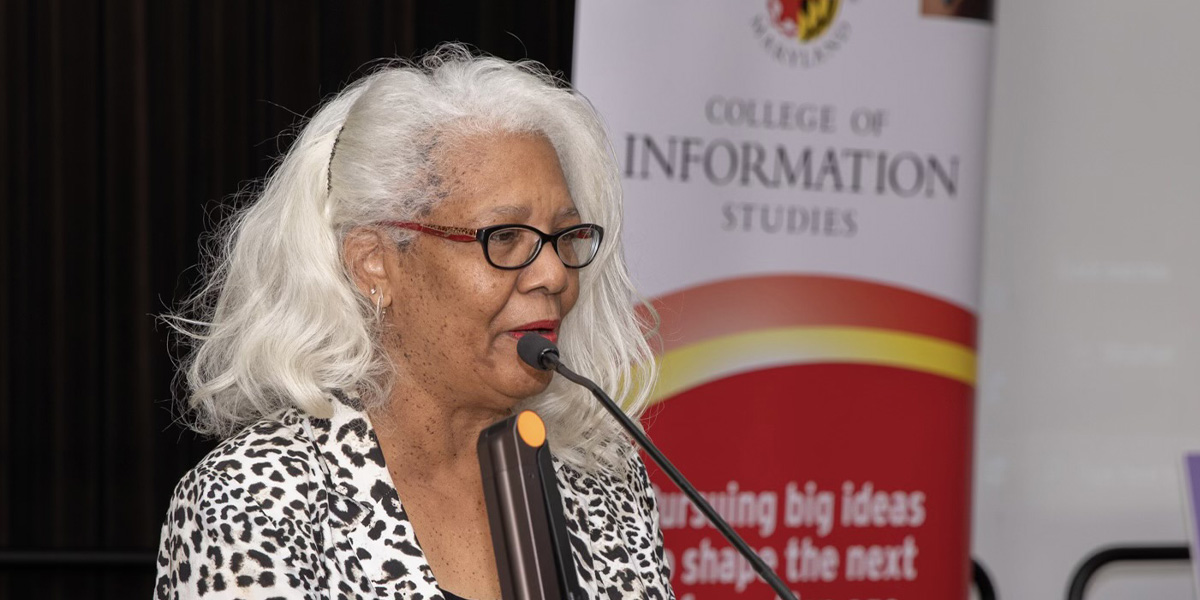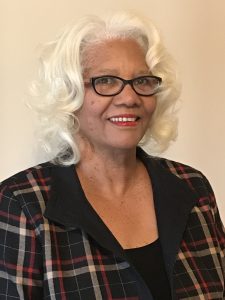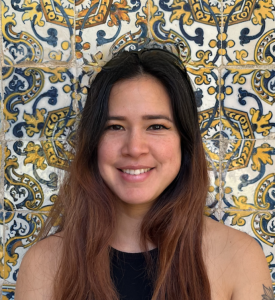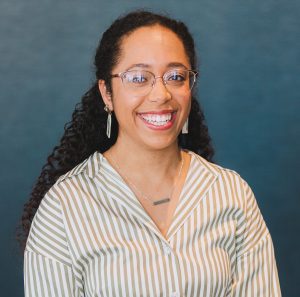A scholarship supports students looking to build inclusive communities

Public libraries are one of the last communal spaces where people can gather, connect, and learn without needing to purchase anything. People of all ages, races, abilities, and backgrounds can find a space for themselves. An unhoused person can connect to the internet; someone with low vision can find large print materials; children can see their cultures represented in an array of books written in languages from all over the world. It is important for library staff and leadership to reflect the diversity of the populations they serve. The B. Parker Hamilton Libraries of the Future Scholarship is for master of library and information science (MLIS) students at the University of Maryland College of Information (INFO) who are committed to championing diversity and promoting equity and inclusion in their careers.

Parker Hamilton
Parker Hamilton was director of public libraries in Montgomery County for 12 years. She knows what new librarians face in the current climate of book bans and censorship, which threaten to undo decades of work to make libraries inclusive. “I think the world of our profession is being challenged today,” Hamilton says.
Hamilton’s scholarship affirms MLIS students that their focus on diversity, equity, and inclusion matters. It has also created a community of professionals with a shared mission, many of whom reach back to help those still in school through donations and mentorship.
“It’s all about being a good steward of what we have been given,” she says, emphasizing how financial support to the college is a good investment as it helps build the next generation of librarians.
Envisioning the Future

Gabi Kim Huesca
Gabi Kim Huesca, assistant branch manager at the City of Fairfax Library, is the inaugural recipient of the prestigious scholarship. “When I received the official scholarship, there was a ceremony and I got to meet Parker and chat,” Huesca says. She recalls Hamilton’s appreciation for her efforts in facilitating a women of color book club, which exclusively features authors who are women of color. “She really praised me for that and said that we need to carve out spaces for communities so we can build community with one another. And it really felt encouraging, like I’m doing the right thing.”
Huesca’s recognition goes beyond just personal accomplishment. It symbolizes the ongoing labor and dedication of many librarians of color who came before her. “I think it’s all the other librarians of color that have really paved the way for us now. And I’m the only person of color on my management team currently. I’m one of the few information managers of color in the system. And it’s not lost on me that there’s a severe lack of representation.”
Acknowledging Hamilton’s role, Huesca emphasizes the significance of fostering inclusive leadership. “I think what Parker is doing and has done is create one of the many pathways for us to be able to move up. That’s really cool.”
Looking ahead, Huesca envisions a more diverse and inclusive decision-making process within the library system. “I want to make sure that there are other women of color in the room with me when we are making decisions about how we run the library, what services we offer, what resources we focus on, where we put our budget. I think that’s the next step for me.”
Building Community

Karen Adjei
In 2021, Karen Adjei was awarded the scholarship, marking the beginning of a new chapter in her academic and professional journey. In May 2024, she graduated and secured a role with Atla, also known as the American Theological Library Association.
“It’s basically a library association that works with theology and religious studies and supports librarians who are in those fields,” Adjei says. “I was a student member of Atla for my entire time at UMD in the MLIS program, and they really just helped me in so many ways with professional development.” Her deep connection to Atla made her current position there a natural fit. “Now I work there, which is nice because they know me and I feel like it’s a nice continuation of exploring my interest in theology and religion.”
Adjei’s aspirations extend beyond her current role. “Eventually, I would definitely love to move to Japan and explore this intersection of theology and religion and art and information and history and reconciliation,” she says.
Reflecting on the scholarship that propelled her forward, Adjei says, “It was very validating that my interest is recognized by the university and it is very needed in libraries and information in the world in general.” The scholarship was more than just financial aid. “I felt like maybe it was just the motivator to take more seriously my interest in diversity and reconciliation and storytelling.”
Hamilton’s impact on Montgomery County and libraries has left a lasting impression on Adjei. “I’m currently in Montgomery County, so I feel like in an indirect sense, I’m kind of a recipient of her work and I’m benefiting from the way she championed information and working with communities.”